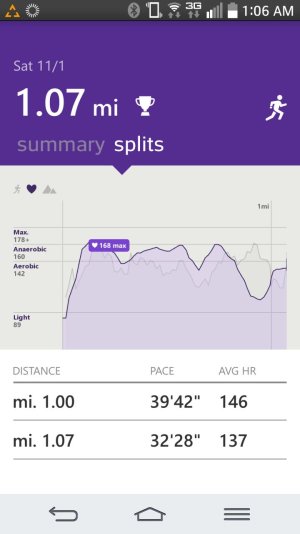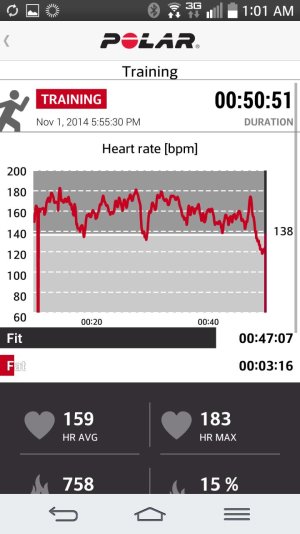I have 42 minutes of tennis heart rate data vs. the Polar Loop.
MS Band:
144 ave
168 high & 80 low
Polar Loop (w/ chest strap):
162 ave
183 high & 131 low
The Band stopped recording after 42 minutes (!) which I did not realize at the time. There may have been a notification interruption or 2. I wonder if that caused a pause.
I used the Band's GPS and it said I covered 1.07 miles, which is cool to track for tennis, but I'm not sure it was on for the whole period. It let me start without GPS and then GPS kicked in at some point later. This was actually one of the notifications I remember, and it was like 20 minutes or something after I had started!
The graphs actually look similar in shape when you compare the 42 min period,, but the MS graph is extremely smoothed out - rolling hills vs. the jagged peaks provided by Polar.
Maybe the band works better for plain running, with less arm movements than tennis. That's what I was originally excited to use for - low HR training for running - but I feel like I can't trust it now. The active heart rate reading being intermittent is another strike against it for that use.
It fit tight (with display on inside of wrist), so I don't think that was the problem. Other than the HR being totally inaccurate, the other con for me is the comfort. It just feels tight and kind of sweaty. I wouldn't want to wear it 24/7. I wear the Loop more loose and it hasn't been a problem, plus the Loop feels lightweight in comparison.
I'm not really surprised about the HR. I asked 2 phone reps, a chat rep, and the retail store sales person if the HR was accurate and they all said yes, but I didn't trust them since there was no documentation anywhere. I agree with earlier comments that the documentation or even basic descriptions of what it's supposed to be able to do are completely lacking. I guess that adds to the discovery experience...I also agree that blog article was misleadingly optimistic about the HR technology. It did give me hope. Oh well. It's a cool device and I see the potential for all kinds of great features. This thread probably saved me a call to tech support. Sounds like that won't get anywhere.
Note: the HR numbers above are for the same 42 min. period. I was able to get that on the Polar website. The screenshot below has a longer time period for the Loop, so the numbers won't match. Also, I wasn't able to get a screenshot of the Band Summary numbers. The Summary page had the GPS map but no other graphs. I had to go to the Splits to get the graphs.






